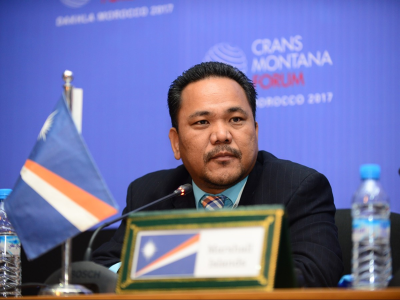Marshall Islands Halt Talks with US Over Nuclear Testing Dispute

All Global Research articles can be read in 51 languages by activating the “Translate Website” drop down menu on the top banner of our home page (Desktop version).
To receive Global Research’s Daily Newsletter (selected articles), click here.
Follow us on Instagram and Twitter and subscribe to our Telegram Channel. Feel free to repost and share widely Global Research articles.
***
The Marshall Islands decide to halt talks with the US regarding the extension of the conditions of the Compact of Free Association over a 70-year-long dispute regarding nuclear testing.
The Marshall Islands suspended major discussions with the US on Friday over longstanding concerns, stretching back 70 years, pertaining to nuclear testing on the atolls in the middle of the Pacific.
Talks in Majuro to extend the conditions of the Compact of Free Association, an important international agreement between the United States, the Marshall Islands, Micronesia, and Palau, were called off.
The Marshall Islands have refused to continue discussions unless Washington addresses the persistent health, environmental, and economic difficulties caused by US nuclear testing on the picturesque atolls from 1946 to 1958.
During the second round of negotiations in July, the Marshalls presented a potential settlement deal to US negotiators, but have received no response.
Marshall Islands’ parliament’s speaker, Kenneth Kedi, said “We submitted our proposal in writing, but there has been no answer or counter-proposal from the US,” adding that “We are negotiating in good faith.”
The Marshallese team renegotiating the deal is refusing to fly to Washington for additional talks.
Kedi said Friday that it was “not prudent to spend over $100,000 for our delegation to travel to Washington” unless their problems were addressed.
According to a statement issued by the US embassy in Majuro, Joseph Yun, the US special envoy for Compact negotiations, will meet with Islands’ President David Kabua next week in Washington “to continue to advance the discussions.”
Marshall Islands-US relations
In the midst of persistent tensions between Beijing and Washington, the Marshall Islands nation is one of the most important US allies in the Pacific.
The US’ attitude, however, delays the pace of the discussions, straining ties between the Marshall Islands and Washington on the eve of next week’s summit of Pacific Island leaders at the White House.
The previous 20-year financing arrangement ends at the end of September 2023, therefore US officials hoped for a quick resolution to the Compact talks.
However, the Marshall Islands’ grievances over nuclear testing continue to be ignored by the US administration.
The chairman of the country’s National Nuclear Commission, Alson Kelen, said
“The cancellation of the talks indicates the seriousness of this issue for the Marshall Islands,” adding that “This is the best time for us to stand up for our rights. We live with the problem (from the nuclear tests). We know the big picture: bombs tested, people relocated from their islands, and people exposed to nuclear fallout. We can’t change that.”
Kelen argued, instead, that
“What we can do now is work on the details for the funding needed to mitigate the problems from the nuclear legacy.”
*
Note to readers: Please click the share buttons above or below. Follow us on Instagram and Twitter and subscribe to our Telegram Channel. Feel free to repost and share widely Global Research articles.
Featured image is from Al Mayadeen English

